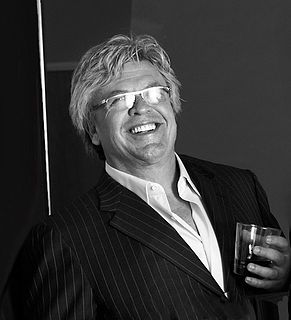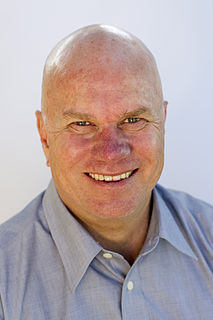A Quote by James C. Collins
Genius of AND. Embrace both extremes on a number of dimensions at the same time. Instead of choosing a OR B, figure out how to have A AND B-purpose AND profit, continuity AND change, freedom AND responsibility, etc.
Related Quotes
Genius is its own reward; for the best that one is, one must necessarily be for oneself. . . . Further, genius consists in the working of the free intellect., and as a consequence the productions of genius serve no useful purpose. The work of genius may be music, philosophy, painting, or poetry; it is nothing for use or profit. To be useless and unprofitable is one of the characteristics of genius; it is their patent of nobility.
Artists are just entrepreneurs. It's up to them to figure out how or if they can make a monetary profit from their passion ? from their calling, as I discussed above. Sometimes they can. Musicians can sell music, even in the face of piracy. Or they can sell their services ? concerts, etc. Painters and other artists can profit in similar ways. A novelist could use kickstarter for a sequel or get paid to consult on a movie version.
Evaluate. Long experience had taught me to evaluate and assess. When the unexpected gets dumped on you, don’t waste time. Don’t figure out how or why it happened. Don’t recriminate. Don’t figure out whose fault it is. Don’t work out how to avoid the same mistake next time. All of that you do later. If you survive.
Many entrepreneurs embrace profit-making and charitable purposes. Companies such as shoes seller Toms and eyeglass firm Warby Parker sell products at a profit with a pledge to devote part of their earnings to the needy. The number of for-profit businesses with a built-in charitable dimension has proliferated.
People assume that because I'm a celebrity and have this platform that I always know what I'm talking about. I guess I don't always know what I'm talking about because I'm a kid who's trying to figure it out amid all the chaos of the world at large, and also the chaos of having this voice and responsibility. At the same time, this voice and responsibility has been the biggest blessing because I'm able to create change just by posting something on Instagram. That's really amazing. I can't believe that I get to have that megaphone and I get to decide how to use it.
Leibniz believed in freedom, both divine and human, and he thought that contingency was a necessary condition of freedom. That is, if an agent A acts freely when choosing X, then A's choosing X cannot be necessary. But there are some elements in his philosophy that seem to make contingency impossible.
It's something that I know how to do because I taught for a very long time, so I can do it, and I feel a responsibility to do it - for instance, in this situation, where I'm touring specifically for this period of time. But most writers are not public people. There are a few writers out there who really enjoy it and are good at it, and can both work and do that at the same time, but I'm not one of those people.



































